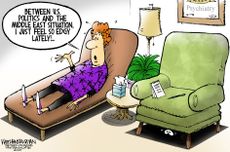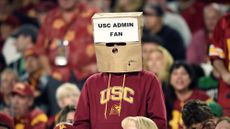Snubbing Nigeria for Ghana
The first African-American president will soon make his first official state visit to an African country. Why did he favor Ghana over Nigeria?
President Obama is deliberately snubbing Nigeria, said Ikeazor Akaraiwe in Nigeria’s Vanguard. The first African-American president will soon make his first official state visit to an African country. But that country will not be Nigeria, which has the largest black population in the world and is a “key supplier of crude oil” to the U.S. Instead, Obama is going to Ghana, a much smaller West African nation with little U.S. trade. By itself, “a visit by a U.S. president does not necessarily confer greatness upon a nation,” but Obama’s choice of Ghana is clearly a mark of favor—a sign that the country is worthy of notice. Ghana holds fair elections and has a vibrant economy. Nigeria, though known as the “giant of Africa,” is a giant that “continues to stumble like a drunken man.”
Nigerians are embarrassed that Obama won’t stop by, said Sola Odunfa in Modern Ghana. I was recently talking to a retired Nigerian diplomat who asked not to be named, and he said that in his day, every diplomat in all the Nigerian missions “in Europe and America would have been mobilized to ensure that President Obama at least made an airport stop” in Nigeria. After all, it’s practically next door to Ghana. The current Nigerian government, though, is so riddled with corruption that even its own diplomatic corps doesn’t listen to it.
The truth is, Nigeria doesn’t deserve the honor of a presidential visit, said Nigeria’s This Day in an editorial. Rumor has it that Nigeria was passed over because of “recent democratic shortcomings”—such as the 2007 elections, internationally condemned as fraudulent. Let this be a wake-up call to Nigerian leaders. “Disappointing as the Americans’ decision is, what it suggests is that Nigeria should stop sulking over the neglect it has suffered and work on its obvious deficiencies.”
Subscribe to The Week
Escape your echo chamber. Get the facts behind the news, plus analysis from multiple perspectives.

Sign up for The Week's Free Newsletters
From our morning news briefing to a weekly Good News Newsletter, get the best of The Week delivered directly to your inbox.
From our morning news briefing to a weekly Good News Newsletter, get the best of The Week delivered directly to your inbox.
Nigeria’s best-known author agrees, said The Ghanaian Times. The Nobel Prize winner Wole Soyinka said Obama’s neglect was exactly the shock that Nigeria needs to spur it to get its act together. He actually said he’d “stone’’ Obama if he showed up in Nigeria and conferred legitimacy on its sorry government. “The message he is sending by going to Ghana is so obvious, is so brilliant, that he must not render it flawed by coming to Nigeria any time soon,” Soyinka said. The Nigerian government called Soyinka’s comments “unpatriotic.” From the Ghanaian point of view, of course, the choice was a no-brainer. “Nigeria is a failed state, while Ghana is both a thriving democracy and a political success in Africa—thus it was Obama’s preference.”
Ghana won this honor on the merits, said Asare Otchere-Darko in Ghanaweb.com. Since 1992, Ghana has enjoyed true, multiparty democracy, with incumbents stepping down once they reach their term limits. But the Obama visit is more than just a recognition that Ghana is a “beacon of hope” for Africa. We have plenty to offer the Americans. The U.S. wants to “out-muscle China” in the race to get access to African oil, and it wants a site for its new African military base. Ghana, as the most stable country in the oil belt of West Africa, is the ideal partner for the U.S. “It can be a win-win situation.”
Sign up for Today's Best Articles in your inbox
A free daily email with the biggest news stories of the day – and the best features from TheWeek.com
Create an account with the same email registered to your subscription to unlock access.
-
 Today's political cartoons - April 17, 2024
Today's political cartoons - April 17, 2024Cartoons Wednesday's cartoons - political anxiety, jury sorting hat, and more
By The Week US Published
-
 Arid Gulf states hit with year's worth of rain
Arid Gulf states hit with year's worth of rainSpeed Read The historic flooding in Dubai is tied to climate change
By Peter Weber, The Week US Published
-
 USC under fire for canceling valedictorian speech
USC under fire for canceling valedictorian speechSpeed Read Citing safety concerns, the university canceled a pro-Palestinian student's speech
By Rafi Schwartz, The Week US Published
-
 Arizona court reinstates 1864 abortion ban
Arizona court reinstates 1864 abortion banSpeed Read The law makes all abortions illegal in the state except to save the mother's life
By Rafi Schwartz, The Week US Published
-
 Trump, billions richer, is selling Bibles
Trump, billions richer, is selling BiblesSpeed Read The former president is hawking a $60 "God Bless the USA Bible"
By Peter Weber, The Week US Published
-
 The debate about Biden's age and mental fitness
The debate about Biden's age and mental fitnessIn Depth Some critics argue Biden is too old to run again. Does the argument have merit?
By Grayson Quay Published
-
 How would a second Trump presidency affect Britain?
How would a second Trump presidency affect Britain?Today's Big Question Re-election of Republican frontrunner could threaten UK security, warns former head of secret service
By Harriet Marsden, The Week UK Published
-
 'Rwanda plan is less a deterrent and more a bluff'
'Rwanda plan is less a deterrent and more a bluff'Instant Opinion Opinion, comment and editorials of the day
By The Week UK Published
-
 Henry Kissinger dies aged 100: a complicated legacy?
Henry Kissinger dies aged 100: a complicated legacy?Talking Point Top US diplomat and Nobel Peace Prize winner remembered as both foreign policy genius and war criminal
By Harriet Marsden, The Week UK Last updated
-
 Trump’s rhetoric: a shift to 'straight-up Nazi talk'
Trump’s rhetoric: a shift to 'straight-up Nazi talk'Why everyone's talking about Would-be president's sinister language is backed by an incendiary policy agenda, say commentators
By The Week UK Published
-
 More covfefe: is the world ready for a second Donald Trump presidency?
More covfefe: is the world ready for a second Donald Trump presidency?Today's Big Question Republican's re-election would be a 'nightmare' scenario for Europe, Ukraine and the West
By Sorcha Bradley, The Week UK Published